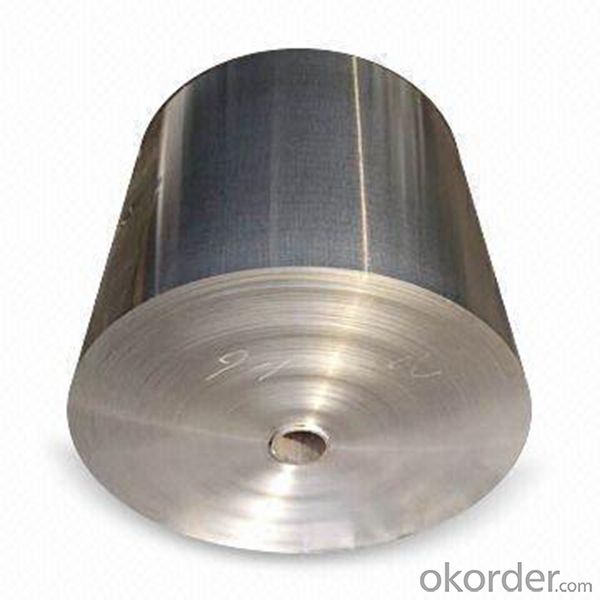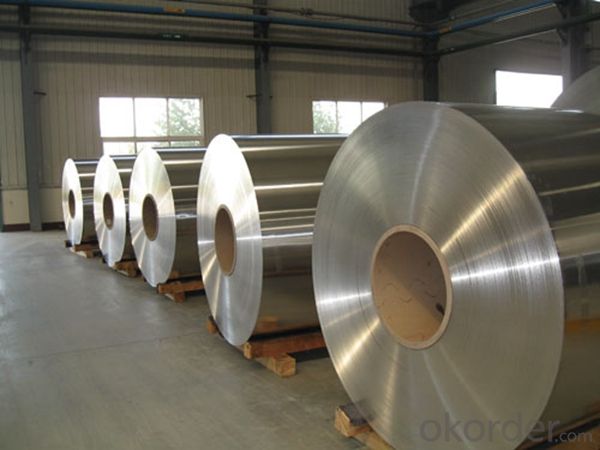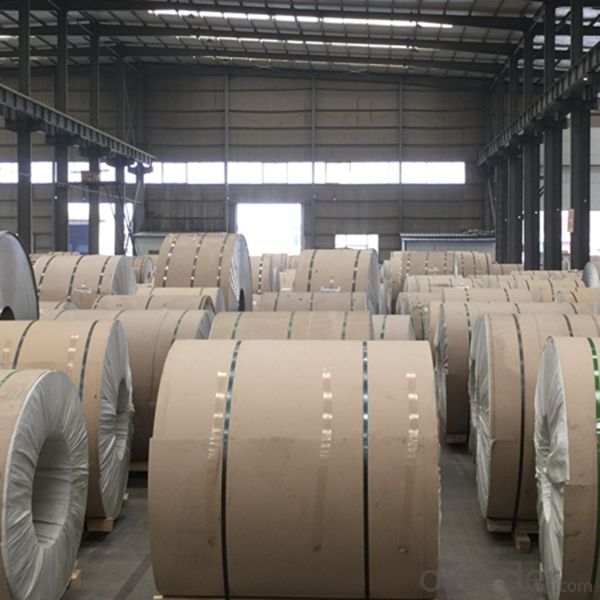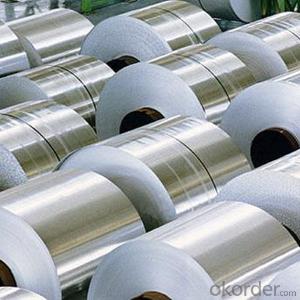Thin Aluminum Coil Alloy used for Foil Stock
- Loading Port:
- Shanghai
- Payment Terms:
- TT OR LC
- Min Order Qty:
- 5 m.t.
- Supply Capability:
- 10000 m.t./month
OKorder Service Pledge
OKorder Financial Service
You Might Also Like
Item specifice
1. Specification of Thin Aluminum Coil Alloy used for Foil Stock
characteristics | Application |
1) Super peeling strength | 1) Building exterior curtain walls |
2) Excellent surface flatness and smoothness | 2) Decoration and renovation additions for old buildings |
3) Superior weather, corrosion, pollutant resistance | 3) Decoration of interior walls, ceilings, bathrooms, kitchens and balconies |
4) Even coating, various colors | 4) Shop door decorations |
5) Fireproof, excellent heat and sound insulation | 5) Advertisement board display platforms and signboards |
6) Superior impact resistance | 6) Wallboards and ceilings for tunnels |
7) Lightweight and easy to process | 7) Industrial materials, materials for vehicles and boats |
2. Application of Thin Aluminum Coil Alloy used for Foil Stock
(1).Interior: wall cladding, ceilings, bathrooms, kitchens and balconies, shutters, doors...
(2).Exterior: wall cladding, facades, roofing, canopies, tunnels,column covers , renovations...
(3).Advertisement: display platforms, signboards, fascia, shop fronts...
3. Feature of Thin Aluminum Coil Alloy used for Foil Stock
*Such coil is specially designed to replace aluminum ingot, due to the high export tax of aluminum ingot, the coil has better price than ingot.
*This type of coil can fit customer's remelting furnace just like ingot, no need to make any change to the production line that was previously used for ingot. The standard coil size and weight is very suitable for the feed gate of furnace.
*This type of coil causes less material wastage than ingot when remelted.
*Our coil is made directly from ore, no need to go though the ingot making process, quality is much better than other suppliers who use ingot scrap to make coil.
Be free from Oil Stain, Dent, Inclusion, Scratches, Stain, Oxide Dicoloration, Breaks, Corrosion, Roll Marks, Dirt Streaks and other defect which will interfere with use
4. Certificate:
SGS and ROHS(if client request, paid by client), MTC(plant provided), Certificate of Origin(FORM A, FORM E, CO), Bureau Veritas and SGS (if client request, paid by client), CIQS certificate
5. Image of Thin Aluminum Coil Alloy used for Foil Stock



6. Package and shipping of Thin Aluminum Coil Alloy used for Foil Stock
eye to wall
eye to the wall
with wood pallet (wooded case also available)
7. FAQ
1) What is the delivery time?
Dpends on actual order, around 20 to 35 days
2)What is the QC system:
We have QC staff of 20 persons and advanced equipment, each production is with MTC traced from Aluminum ingot lot.
3) What market do you mainly sell to?
Australia, America, Asia, Middle East, Western Europe, Africa etc
- Q:I had a physics exams today and it was asking whether or not a shiny surface aluminium blanket was suitable to keep the sleeper warm. I put that because it's a conductor of electricitiy, heat loss will be greater so it wont be suitable for keeping him warm. On the other hand, some other people said that because it had a shiny surface, thus a good reflector of heat, it would be suitable for keeping him warm. Are both arguments correct?
- Metals are reflective for the comparable reason that they habit electrical energy. The steel has an excellent number of electrons that are very loosely guaranteed to the atoms; they are in a position to leap from one atom to a distinctive very quite. that's virtually like a sea of electrons. Electrons soak up photons of sunshine then re-emit them in random instructions, that's stated as scattering. you are able to think of that if the electrons emit the photons in random instructions then the floor could be boring white, no longer vivid, yet in reality so long as a results of fact the floor irregularities on the steel are smaller than a wavelength of sunshine each and all of the photons entering into extraordinary instructions cancel one yet another out, in simple terms leaving those that leap off on the comparable attitude they arrived at - mirrored photograph in different words. Metals are literally sparkling. you are able to locate that frustrating to have self belief yet once you're finding at an liquid crystal reveal reveal screen you're finding by using a layer of steel now - it varieties electric powered circuits on the returned of the glass reveal. Any cloth that reflects easy additionally transmits it. while the electrons are greater efficient at interacting with the photons of sunshine the fabric is greater reflective, as in a steel; while fewer electrons are interacting with the easy the fabric is greater transmissive, like glass or water. yet observe that cup and water the two mirror easy besides as transmit it.
- Q:What’s the production standard of aluminum coil?
- GB/T3880-2006 mechanical standard GB/T3190-1996 chemical standard
- Q:Can aluminum coils be used in agricultural applications?
- Yes, aluminum coils can be used in agricultural applications. Aluminum is a versatile and lightweight material that offers several benefits for agricultural purposes. Aluminum coils are commonly used in various agricultural equipment and structures, such as greenhouse frames, irrigation systems, and grain storage bins. One of the main advantages of using aluminum coils in agricultural applications is their resistance to corrosion. Aluminum is naturally resistant to rust and can withstand exposure to moisture, chemicals, and other elements commonly found in agricultural environments. This makes it a durable and long-lasting choice for agricultural equipment that needs to withstand harsh conditions. Additionally, aluminum coils have excellent thermal conductivity, meaning they can efficiently transfer heat. This property makes aluminum coils suitable for applications such as heat exchangers, which are often used in agricultural machinery like tractors and combine harvesters. Efficient heat transfer helps in maintaining optimal operating temperatures and improving overall equipment performance. Moreover, aluminum coils are lightweight, which makes them easy to handle and transport. This is particularly advantageous in agricultural applications where equipment needs to be moved frequently, such as portable irrigation systems or lightweight structures. The lightweight nature of aluminum also helps reduce fuel consumption in machinery, leading to cost savings and environmental benefits. Furthermore, aluminum is a non-toxic material, making it safe to use in agricultural applications. It does not release any harmful chemicals or leach into the soil, ensuring that crops remain uncontaminated and safe for consumption. In summary, aluminum coils can indeed be used in agricultural applications due to their corrosion resistance, thermal conductivity, lightweight nature, and non-toxic properties. These qualities make aluminum a reliable and efficient choice for various agricultural equipment and structures, contributing to increased productivity and sustainability in the agricultural industry.
- Q:Can aluminum coils be used in extreme temperature conditions?
- Yes, aluminum coils can be used in extreme temperature conditions. Aluminum has a high melting point of 660.32°C (1220.58°F) and can withstand extreme heat without deforming or melting. Additionally, aluminum has excellent thermal conductivity, allowing it to quickly transfer heat away from the coil. This makes it suitable for various applications, including air conditioning, refrigeration, and heating systems that may encounter extreme temperature conditions. Moreover, aluminum coils are lightweight and corrosion-resistant, making them a preferred choice in many industries.
- Q:Aluminum roll, which companies are used?
- Too many things that you can see every day, with all the things that are made of aluminum, and the companies that make these aluminum products are useful, so it's unclear!
- Q:When you open an aluminum beverage can, do particles of aluminum get into the drink?
- It depends on the type of drink inside the can. Aluminium is a metal in the group three of the periodic table of elements so it has three positive charges when ionized although it has metallic bond between its nucleus and its electrons. If the drink contains too much acid such as HCl with a high concentration the acid may react with the aluminium can if it is not coated or galvanized. Although it may not physically break off for the particles to enter the drink, it may dissolute in the kind of substance inside the drink.
- Q:Are there any limitations on the anodizing of aluminum coils?
- The anodizing of aluminum coils is subject to certain limitations. To begin with, the size and weight of the aluminum coils can present constraints. Anodizing is typically carried out in tanks or baths, so the coil must fit within the tank's capacity. Moreover, larger and heavier coils may necessitate specialized equipment or processes to ensure proper anodizing. Furthermore, the alloy composition of the aluminum coils can impact the anodizing process. Different aluminum alloys respond differently to anodizing, and some alloys may not anodize as effectively as others. It is crucial to consider the alloy composition and seek advice from experts to determine the suitability and potential limitations of anodizing specific aluminum coils. Additionally, the surface condition of the coils can influence the quality of anodizing. Imperfections such as scratches, dents, or surface contaminants can affect the consistency and uniformity of the anodized layer. It is vital to thoroughly clean and prepare the coils before anodizing to achieve the desired outcome. Lastly, certain design features or complex shapes of the aluminum coils can present challenges for anodizing. Anodizing involves immersing the coil in an electrolyte solution, and intricate designs or complex shapes may hinder the achievement of a uniform coating thickness. Overcoming these limitations may require specialized masking or racking techniques. Collaborating closely with anodizing experts or service providers is essential to comprehend and address any limitations specific to the aluminum coils, ultimately achieving the desired anodizing results.
- Q:Why does aluminum foil barely get hot in the oven, but catch fire in the microwave?
- the oven radiates heats it up by heating it from the outside in the microwave radiates microwaves to get water, sugar, and fat moving, heating the food from the inside and the outside. since the foil has none of these the bombardment of waves has a different effect. the atomic structure of the foil burns when it gets hit with microwaves
- Q:How exactly can you tell (just by looking) that the nipple used to tighten a spoke is brass and not aluminum? I know some are silver - not sure if they are painted silver or what. But without scraping or causing any damage to the nipple, how would one know for sure if they have no experience between the two.p.s. I don't know how heavy or light either is, so if that is one way to tel, it's not a good way for me.
- Not ure
- Q:Are there any limitations to using aluminum coils?
- Using aluminum coils comes with several limitations. Firstly, their cost is higher compared to other materials like copper, which can be a constraint for those with budget constraints. Secondly, aluminum coils have lower thermal conductivity than copper coils. This means they are less efficient at transferring heat, resulting in decreased performance in some applications. In addition, aluminum is more prone to corrosion and oxidation than other materials. This limitation is particularly relevant in highly corrosive environments, like coastal areas or industrial settings. Moreover, aluminum coils are generally unsuitable for high-pressure applications. They are more likely to experience leaks or failures under high pressure, which restricts their use in certain HVAC systems or refrigeration units. Lastly, aluminum coils are less malleable than copper coils, making them more challenging to handle during installation or repair. This can lead to increased labor costs or potential damage to the coils during handling. Overall, although aluminum coils have advantages like being lightweight and environmentally friendly, their limitations must be carefully considered based on the specific application and requirements.
1. Manufacturer Overview |
|
|---|---|
| Location | |
| Year Established | |
| Annual Output Value | |
| Main Markets | |
| Company Certifications | |
2. Manufacturer Certificates |
|
|---|---|
| a) Certification Name | |
| Range | |
| Reference | |
| Validity Period | |
3. Manufacturer Capability |
|
|---|---|
| a)Trade Capacity | |
| Nearest Port | |
| Export Percentage | |
| No.of Employees in Trade Department | |
| Language Spoken: | |
| b)Factory Information | |
| Factory Size: | |
| No. of Production Lines | |
| Contract Manufacturing | |
| Product Price Range | |
Send your message to us
Thin Aluminum Coil Alloy used for Foil Stock
- Loading Port:
- Shanghai
- Payment Terms:
- TT OR LC
- Min Order Qty:
- 5 m.t.
- Supply Capability:
- 10000 m.t./month
OKorder Service Pledge
OKorder Financial Service
Similar products
New products
Hot products
Hot Searches
Related keywords




























